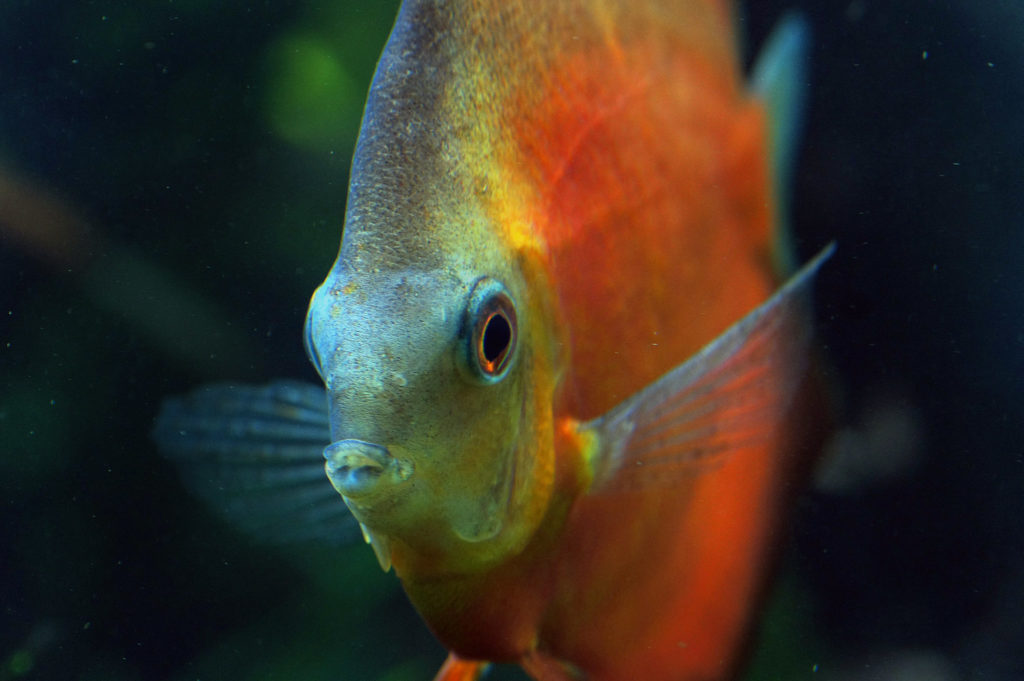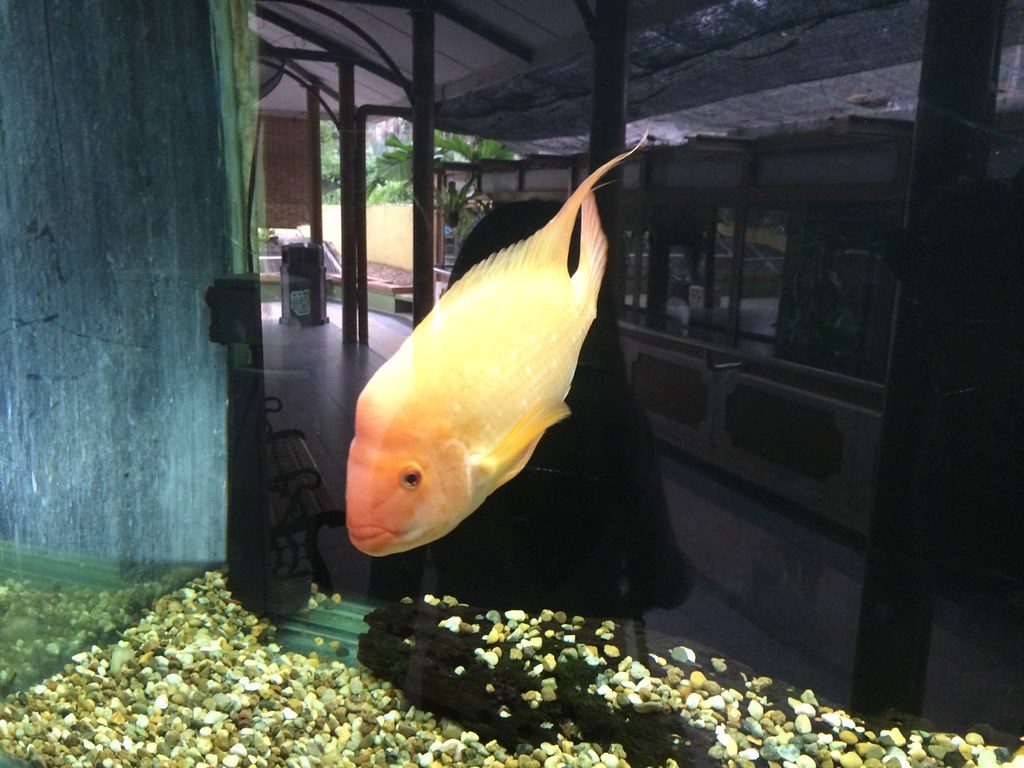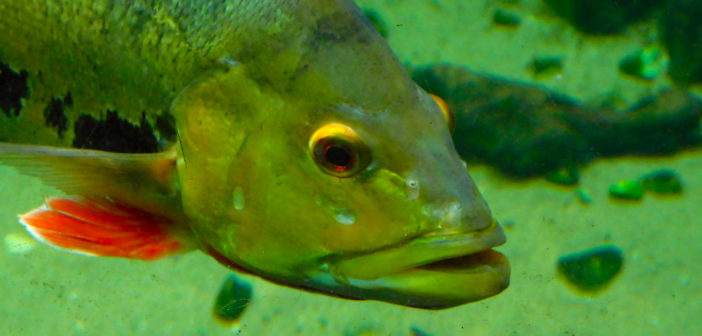Written by Nicole Pallotta, Academic Outreach Manager
Animals are defined as “property” under United States law, which complicates efforts to advocate for them through the legal system. Property classification is not the only aspect of animals’ legal status that presents challenges. Also problematic is when animals are expressly excluded from the definition of “animal” under state cruelty laws, as this case illustrates.
In April 2019, a North Carolina man was arrested and charged with four animal cruelty misdemeanors — one count of animal abandonment and three counts of cruelty to animals — for failing to provide his oscar fish with food and fresh water and abandoning the animal in his home when he was evicted. The fish was malnourished, swimming in a dirty tank, and suffering from a parasitic disease when discovered by authorities in the abandoned residence.
While animal cruelty prosecutions involving fish are rare, Lt. Jerry Brewer, a spokesman for the New Hanover County Sheriff’s Office, said: “This is a life just like any dog or cat. If you harm or neglect an animal in New Hanover County, we are coming for you.” Authorities believe it was the first time a suspect had been charged in the county with cruelty over a pet fish.
The following week, however, all of the charges were dropped because according to North Carolina’s animal cruelty law, fish are not “animals.” The state’s animal cruelty statute defines animals as “every living vertebrate in the classes Amphibia, Reptilia, Aves, and Mammalia except human beings.” Fish are not represented in these categories and are the only vertebrate class not included.
In a statement, New Hanover County District Attorney Ben David said: “We take a very dim view of anyone who would abuse any creature great or small and appreciate [the Animal Services Division’s]enforcement of the laws to protect vulnerable animals. Fish are not included in this statute, however, so my office is dismissing these charges.”

A discus fish. Why should fish not be considered animals under the law? Image credit Bernard Spragg, CC BY-SA 3.0.
What is an “Animal”?
Despite the fact that they are living beings, animals are defined under U.S. law as property, which has been an obstacle to gaining recognition of their basic legal rights. Animal cruelty laws are one of the few legal protections animals have that distinguish them from other types of property. However, some animals are not even granted the basic status of “animal” under the law, meaning they are generally excluded from even the elementary protections provided by animal cruelty statutes.
Animal cruelty laws are powerful tools to protect animals. But these protections are watered down in important ways, such as by exempting otherwise lawful practices that harm animals (e.g., farming, research, and hunting and fishing) and excluding entire classes of animals from the legal definition of “animal,” which leaves them with essentially no statutory protection from abuse and neglect.
The statutory definition of “animal” under cruelty laws varies by state, and does not always adhere to commonly accepted biological and cultural understandings of what an animal is. There are a total of ten states that exclude fish from their statutory definitions of animals. In addition to fish and other aquatic animals, farmed animals (or “standard,” “customary,” or “accepted” farming practices), cold-blooded animals, and wild animals are sometimes excluded by definition from state cruelty laws. Other statutes are more vaguely worded and neither specifically exclude nor include fish and other animals; other states provide no definition whatsoever.
While there is no uniform definition of “animal” under state animal cruelty laws, the situation is not much better when it comes to federal animal protection laws (of which there are few). In addition, as with other animals, if fish are defined as animals at all, the cultural category into which they are placed matters: Being classified as a “pet” (versus “food” or “research subject”) will yield different levels of legal protection. As we have written in “Fins or Fur — How the Law Differs:”
It is now more or less indisputable that aquatic animals like fish feel pain and suffer as other animals do, but they have fewer legal protections than other animals. The federal Animal Welfare Act does not protect fish (or birds, farm animals, rats and mice bred for labs, and reptiles, among others). Fish are also not included in the Humane Slaughter Act or federal laws governing the treatment of animals used in research; not only that, but fish are not counted in the United States Department of Agriculture’s yearly report on animal usage in labs despite the fact that they make up an estimated seven percent of animals used in labs.

A midas cichlid in the Kuching aquarium. Despite plenty of evidence to the contrary, many people consider fish to be incapable or thought, pain, or emotion. Image credit Wolf Gordon Clifton / Animal People, Inc.
Fish Are Living, Feeling Beings
The fish rescued in this case was taken by authorities to a retail pet store called the Fish Room, where employees have been nursing him back to health with a proper diet and medication. One of these employees, according to the Washington Post, characterized oscar fish as “very trainable” with “huge personalities.” Oscar fish can live up to 20 years. The recently rescued fish is estimated to be about a year old.
It was a positive step that the sheriff’s office in this case brought cruelty charges involving a fish, but unfortunate that the district attorney’s hands were tied by North Carolina’s statutory definition of animal, which essentially erases fish and sends the message that their suffering isn’t relevant.
Indeed, fish are living, feeling beings — not essentially different from the animals who are protected by cruelty laws. Animal cruelty laws should be extended to apply to fish where they currently do not. There is no longer any doubt that fish are sentient. Substantial empirical research shows that they feel pain. Therefore, at the very minimum fish should be recognized as “animals” under the law.
According to a study published in the journal Animal Cognition, “fish are seldom afforded the same compassion as warm-blooded vertebrates, in part due to the large gap between people’s perception of fish intelligence and the scientific reality.” This matters because public perception guides government policy. In reviewing the scientific literature, the author concluded that:
Fish perception and cognitive abilities often match or exceed other vertebrates. A review of the evidence for pain perception strongly suggests that fish experience pain in a manner similar to the rest of the vertebrates… The extensive evidence of fish behavioral and cognitive sophistication and pain perception suggests that best practice would be to lend fish the same level of protection as any other vertebrate.

A fish market in Venice. Fish are killed in staggering numbers for human consumption, and usually without guidelines protecting them from unnecessary or prolonged suffering. Image credit Sergey Galyonkin, CC BY-SA 3.0.
Further Reading:
- Weiss, Debra Cassens. “Man accused of abandoning pet fish is off the hook for animal cruelty, DA says.” ABA Journal. April 11, 2019.
- Levenda, Kelly. 2013. “Legislation to Protect the Welfare of Fish.” Animal Law Review. Vol. 20.
- Jabr, Ferris. “Fish Feel Pain. Now What?” Hakai Magazine. Jan. 2, 2018.
- “Legal Treatment of Fish.” Let Fish Live.
- People v. Garcia, 777 N.Y.S.2d 846 (N.Y. 2004) available at https://www.animallaw.info/case/people-v-garcia-0
Featured image: an oscar fish, the same species as the neglected fish in the North Carolina case discussed here. Image credit ekenitr, CC BY-SA 3.0.





